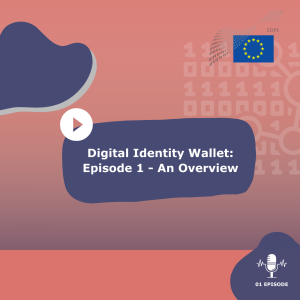
What is it and how does it work? What are its key data protection benefits and risks?
Welcome to the first episode of a three-part podcast series focused on the EU Digital Identity Wallet (DIW), organised by the trainees of the European Data Protection Supervisor and European Data Protection Board.
In this first episode, we introduce the EU DIW and explore the way it works, in accordance with the applicable European legislation, especially GDPR and eIDAS Regulation, as well as the key risks and benefits in relation to data protection.
Consider the number of accounts you have for the services you use online and how many times you have had to prove your identity via your ID, passport, or diploma to a potential university or employer, and have had no other choice but to send a copy of these personal and valuable documents.
This is why the European Commission (EC) introduced in June last year a legislative proposal for a European DIW, as part of the revision to the electronic identification, authentication and trust services (eIDAS) Regulation, known as eIDAS 2. The EC aims to create a Wallet, which will be available to all EU citizens, residents, and businesses in the EU and usable not only for identity documents, but for all attestations, including those with sensitive personal data, such as health data-related documents.
Through this DIW, citizens will be able to prove their identity and share information from their DIW with the click of a button on their phone or another edge device. Furthermore, large online platforms and service providers will be required to accept the use of the EU DIW upon request of the user, creating a counterweight to Apple and Google solutions. These Wallets work with digital IDs to hand control of data back to the individual by allowing them to hold their identity on their device and choose with whom they wish to share the data. However, the Wallets are linked to privacy and security-related issues that must be addressed.
To enlighten these aspects, we invited two experienced specialists from different backgrounds. Viky Manaila, one of the experts assessing the impact of the revision of the eIDAS Regulation in support of the European Commission, and Isabel Skierka, the program leader for Technology Policy, and a researcher with the Digital Society Institute in Berlin.
Viky introduces the DIW and its main benefits, before Isabel addresses the DIW’s risks, similarities with the Apple wallet and the European Commission’s efforts to create competition in the context of the Digital Markets Act proposal.
This podcast is hosted by Rumer Ramsey, and was prepared with the assistance of her fellow trainees, Angeliki Tiligadi, Irena Achilleos, and Rogers Alunge Nnangsope.
This Podcast was recorded on 20 January 2022 and 1 February 2022.